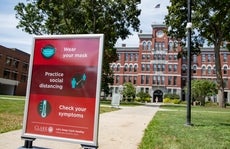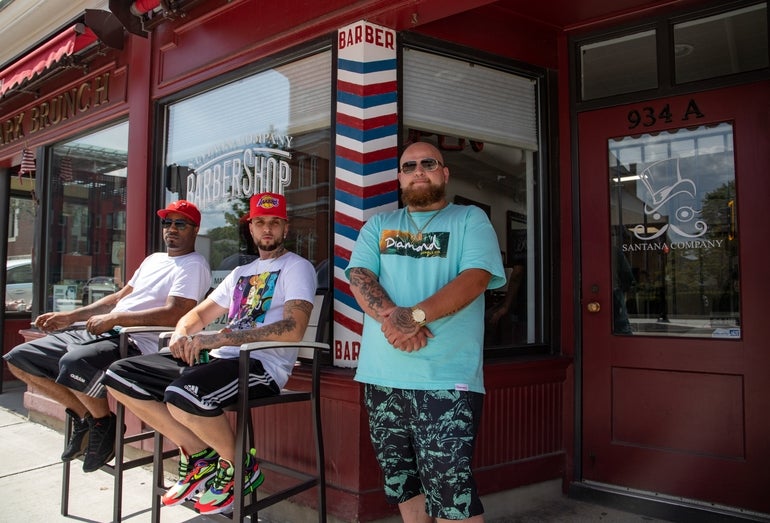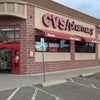
Worcester businesses feel ebb and flow of students
 Photo | Sam Doran/SHNS
Ryan Seger (right), pictured in front of his barbershop next to Clark University's campus
Photo | Sam Doran/SHNS
Ryan Seger (right), pictured in front of his barbershop next to Clark University's campus
The four or five new customers a week Sal Arcuri gains each fall when college students come back to town help his spa and salon, located just down the road from Worcester State University, earn a little extra cash.
"It's always a good thing," he said, sitting inside his business Arcuri Moda. "Everybody's fighting the same thing, new rules, new regulations, trying to move things around. Clients are nervous, you know, they're still nervous coming in. It's definitely a different world."
By all means, Worcester is a college town. In a regular year, the city swells with the arrival of nearly 30,000 students. While it isn't the massive number of students Boston brings in, the central Massachusetts area does experience a boost to the local economy from students. Small pizza joints, barbershops, and bars dot the corners and streets near the major institutions of higher education.
With the onset of COVID-19, many of the colleges in the heart of the commonwealth are looking toward an altered semester. The College of the Holy Cross took the plunge into transitioning fall classes primarily online. The others are mostly taking a hybrid approach with a mix of online and in-person education. And regardless of the fact that fewer students will be in the city, some local businesses that look forward to an extra boost in sales are ready for them to come back.
Originally from Italy, Arcuri came to the United States in 1969 and opened up his business in 1997. He said he has built a good clientele that helped him weather the shutdown.
"Hopefully the fall will be better," he said. "I can't wait for 2020 to be over."
Under the color-coded risk assessment system Gov. Charlie Baker unveiled last week, Worcester is designated as a "yellow" or moderate risk community, with 136 cases over the last two weeks, an average percent positivity rate of 1.98, and 5.1 average daily cases per 100,000 people.
Worcester Mayor Joseph Petty said college students support the local economy, whether it be grocery shopping or heading out to restaurants and entertainment venues.
"A lot of the small businesses depended on the college kids, especially the diners, restaurants in the vicinity of the colleges," he told the News Service. "I think if everybody practices wearing face masks, good hygiene, socially distancing we'll get through this as a city. I think that's the most important thing. I think the colleges are emphasizing that."
The News Service reached out to all the major institutions of higher education in the Worcester area and spoke with the presidents of Clark University, Assumption University, and Worcester State University.

Ryan Seger helps manage Santana Company Barbershop on Main Street, only a few feet away from Clark University. He said college students make up a third of the business during the school year.
"I don't think we're necessarily too worried about them coming back, like public health-wise, because we're pretty careful," he said in front of the shop. "We're excited for them to come back, like money-wise, like, it's gonna be good. It's gonna feel good to have people out and about again, maybe feel a little bit more normal."
Clark University's fall reopening allows students and employees to decide whether they want to return to campus. The institution had a total enrollment of nearly 3,460 in fall 2019, according to data from the National Center for Education Statistics, and Clark President David Fithian said 83 percent of students have indicated their intention to return this coming semester --- about 2,600 students.
One-third of classes are fully online with the rest taking place with a combination of in-person or hybrid learning. Fithian said that model could change depending on whether faculty change their minds about teaching in the classroom or if public health data variates.
Students started to move in on Aug. 15 with the university spreading the process out over seven days. As soon as students arrive on campus, they are tested for COVID-19 and are required to quarantine until test results are returned.
"There's no question that campus is not going to be like it was when students left in March. Certainly not going to be like it was when students came last fall," Fithian told the News Service. "We've been very clear with our students about that and in terms of what they can and can't expect and our absolute reliance on their commitment to and obligation to follow all the health protocols and risk mitigations we put in place."
Seger, the barbershop manager, said it came as a shock to the business when colleges transitioned online in the spring to help curb the spread of the virus.
"Especially in a business like this where we're so college driven, and I feel like a lot of small businesses in Worcester are college driven," he said. "So it was tough for us because usually, you try to save a little bit of money and everything before the kids leave because then they're gonna leave and you're gonna take kind of a financial hit for a little while. So to have them leave so quickly was definitely scary."
Jose Rodriguez runs a nutrition and smoothie shop across the street from the barber, a stone's throw away from Clark University. He said students regularly stop into his shop to grab an energized tea or nutrition drink.
He said he is looking forward to students coming back in the fall.
"When they stop here I have a promotion for the students and I have … the workouts and everything. They like it too," he said.
Worcester State University, the only four-year public institution in the city, is primarily a commuter school with 60 percent of students traveling to campus. Total enrollment came to 6,204 students in fall 2019, according to the NCES data, and the university plans to welcome students back to campus for the fall 2020 semester, both in the classrooms and residence halls.
President Barry Maloney said given that most students commute to campus, WSU officials felt they could develop a plan to safely bring the majority of students to campus with a large portion of classes offered in a hybrid or online format. Maloney said in normal times, WSU could house 1,600 students on campus but he expects around 1,000 students to live at the university in the fall.
"We didn't lose 600 students from the residence halls. We pre-planned to keep a number of spaces vacant as part of a safe return planning so that students can be isolated or quarantined," he said. "Then we have lost some students who once we put out our class schedule ... some of our students and their family decided it would be better for them to learn online, as opposed to live in our residence halls."
Down the road from WSU is Leo's T Bird Pizza, owned for the past 30 years by local resident Leo Varetas. He said he gets some business from the nearby students, administrative staff at the university, and local elementary schools.
"I know the pizza places are still doing good. You know, most of them are still doing good," he said. "I have friends in the breakfast business, they are hurting a lot. I mean, because breakfast people want to go sit down and eat and they shut them down for two months."
WSU is requiring every member of its community to adhere to a "Mutual Contract of Social Responsibility," a document that mandates participation in safety practices training exercises, receiving the flu vaccination in the fall, self-monitoring for COVID-19 symptoms, and participation in testing and contract tracing.
Assumption University is taking a slightly different approach than its counterparts in the city: the institution plans to permit only two classes of students on-campus at one time and divided the fall semester into two terms. Students may also opt to take classes remotely for the entire semester.
President Francesco Cesareo said the university expects to have approximately 800 students on campus for the first fall term. The feel of the campus, he said, will be different in the sense that certain activities the institution usually provides won't be taking place.
Administrative staff and students will need to balance what can be done on campus, he said, and what possibilities might exist outside of the campus.
"We are concerned about students going off-campus, to be honest, because not only do we not want to be spreaders of a virus into the community, but we also don't want them to bring it into the campus, the virus if they're exposed to it in the community," he said. "So what we're trying to do is to strike a balance and recognizing that, you know, this will have an impact on local businesses and restaurants."









0 Comments